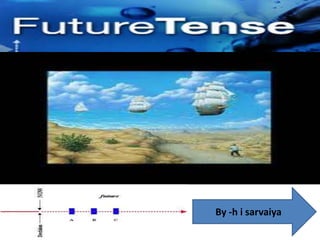Future tense for slideshare
- 1. By -h i sarvaiya
- 2. TENSESFUTURE TENSESimple Future TenseDefinition:The Simple Future Tense is used for indicating those actions that we think will happen in the future. In other words, we predict the future.3/18/2011prepared and presented by - h i sarvaiya2
- 3. TENSESFor example: I think India will win this match.Do you think he will join us for dinner?We shall wait for the bell to ring.3/18/2011prepared and presented by - h i sarvaiya3
- 4. TENSESStructure:3/18/2011prepared and presented by - h i sarvaiya4
- 5. TENSESNote:The verb ŌĆświllŌĆÖ can be used with all the persons.We can also use ŌĆśshallŌĆÖ instead of ŌĆświllŌĆÖ with I and We.Negative of will = wonŌĆÖtNegative of shall = shanŌĆÖt3/18/2011prepared and presented by - h i sarvaiya5
- 6. TENSESUses of the Simple Future Tense:1. When we forecast or predict actions in the future, we often use verbs and expressions like think, expect, believe, hope, be sure etc.3/18/2011prepared and presented by - h i sarvaiya6
- 7. TENSESFor example: They think they will be able to come.I am sure she will refuse this offer.He believes he will be able to stand first.3/18/2011prepared and presented by - h i sarvaiya7
- 8. TENSES2. We also use the Simple Future Tense with will when we decide to do something at the moment of speaking.3/18/2011prepared and presented by - h i sarvaiya8
- 9. 3/18/2011prepared and presented by - h i sarvaiya9
- 10. TENSESFor example:Will you like something to drink?Yes, I will have some coffee.Someone is knocking at the door, so I will see who it is.3/18/2011prepared and presented by - h i sarvaiya10
- 11. TENSES 2. Future Continuous TenseDefinition:We use the Future Continuous Tense to talk about an action or a situation that we think will be continuing at a particular time of the future.3/18/2011prepared and presented by - h i sarvaiya11
- 12. TENSESFor example:I will be watching TV at 8 oŌĆÖclock.They will be hosting a party tomorrow.I shall be visiting my grandparents next week.3/18/2011prepared and presented by - h i sarvaiya12
- 13. TENSESStructure3/18/2011prepared and presented by - h i sarvaiya13
- 14. TENSESUses of Future Continuous Tense:1. We use the Future Continuous Tense to talk about such actions and situations which have been already planned, or which are a part of a regular routine.3/18/2011prepared and presented by - h i sarvaiya14
- 15. TENSESFor example:I will be attending the concert tonight.We shall be seeing each other next week.She will be taking the final exam next month.3/18/2011prepared and presented by - h i sarvaiya15
- 16. 3/18/2011prepared and presented by - h i sarvaiya16
- 17. TENSES2. Future Continuous Tense is often used as a polite way of asking about someoneŌĆÖs plans, especially when we want someone to something for us, i.e. a favour.3/18/2011prepared and presented by - h i sarvaiya17
- 18. TENSESFor example:Will you be going to the market? If yes, could you get me a pen?Will you be using the car this Sunday? I wondered if I could borrow it.3/18/2011prepared and presented by - h i sarvaiya18
- 19. 3/18/2011prepared and presented by - h i sarvaiya19
- 20. 3/18/2011prepared and presented by - h i sarvaiya20
- 21. TENSES3. Future Perfect TenseDefinition:The Future Perfect Tense is used to indicate those actions that will be completed by a certain time in the future, but not later than the specified time.3/18/2011prepared and presented by - h i sarvaiya21
- 22. TENSESLet us understand this with the help of a figurePast time Present timeFuture time 5 oŌĆÖclock 6 oŌĆÖclock 9 oŌĆÖclockI will have finished dinner by 9 oŌĆÖclock.Above sentence makes clear that at a specific time in the future a definite action will get over.3/18/2011prepared and presented by - h i sarvaiya22
- 23. 3/18/2011prepared and presented by - h i sarvaiya23
- 24. TENSESStructure3/18/2011prepared and presented by - h i sarvaiya24
- 25. TENSESUse of Future Perfect Tense:When we use the Future Perfect Tense, we think of a future time and anticipate, that at that particular time, the action will get completed, or over.3/18/2011prepared and presented by - h i sarvaiya25
- 26. TENSES For example:We will have reached Mumbai by 6 oŌĆÖclock tomorrow.You will have graduated in the year 2012.3/18/2011prepared and presented by - h i sarvaiya26
- 27. 3/18/2011prepared and presented by - h i sarvaiya27ŌĆ£By the time this video is finished, You will have learned how to use the future perfect tense.ŌĆØ
- 28. TENSES 4. Future Perfect Continuous TenseDefinition:The Future Perfect Continuous Tense indicates an action which we think will be going on continuously for a given time period of the future. Note: This Tense type is not used very commonly for daily conversations.3/18/2011prepared and presented by - h i sarvaiya28
- 29. TENSESFor example:They will get tired as they will have been travelling all day.I will have been writing this report for the entire day tomorrow.3/18/2011prepared and presented by - h i sarvaiya29
- 30. TENSESStructure:For all the persons, the structure in this Tense type will remain same.subject + will have been + verb + ing + object3/18/2011prepared and presented by - h i sarvaiya30
- 31. 3/18/2011prepared and presented by - h i sarvaiya31
- 32. 3/18/2011prepared and presented by - h i sarvaiya32
- 33. 3/18/2011prepared and presented by - h i sarvaiya33
- 34. TENSESFEED BACKharbhadrasinh@gmail.comhttp://harbhadrasinh.blogspot.com/3/18/2011prepared and presented by - h i sarvaiya34A BIG THANK YOU- h i sarvaiya
Editor's Notes
- #10: Earlier piece from english instructor 3 video
- #17: The future continuous tense last part esp
- #20: Future cont. in two parts if possible two slides lernen structure part specially
- #21: Future cont second part exercise part
- #24: Episode 17
- #28: Will+have video from the begining
- #32: Episode 20
- #33: Last summing up video in two parts two slides in continuation ŌĆśtenses overviewŌĆÖ
- #34: conti


































